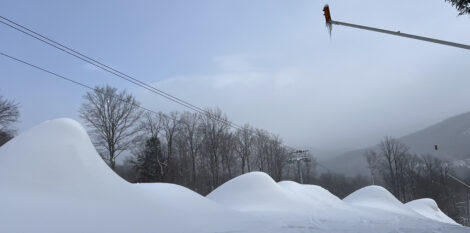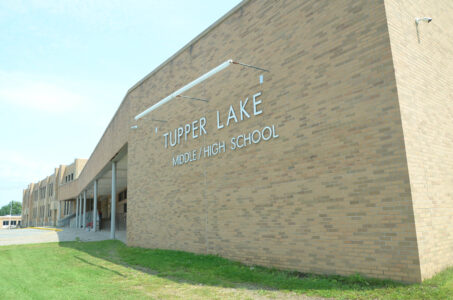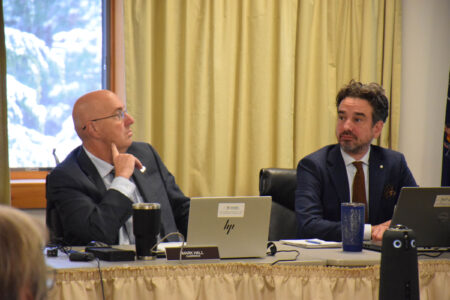Village of Tupper Lake adopts $3.3M budget

Stephen Jellie addresses the Tupper Lake Village Board on Monday, April 21. Behind him, from left, are Trustees Eric Shaheen and David “Haji” Maroun and Mayor Mary Fontana. Jellie stated several concerns relating to the budget and blight in the Junction. (Enterprise photo — Chris Gaige)
TUPPER LAKE — The Tupper Lake Village Board voted unanimously during its April 21 meeting to adopt a budget for the 2025-26 fiscal year.
The budget falls under the state-imposed tax cap, and also marks a slight decrease in total spending — and the tax rate — from last year’s budget.
The budget has appropriations for the coming fiscal year totaling $3,317,206.89, a $1,632.78 decrease from the current fiscal year’s adopted village budget. It amounts to a 0.05% decrease in spending and a 0.13% decrease in the tax rate.
As it stands, village residents would pay $15.76 per $1,000 of assessed property value, a decrease from $15.79. That means someone who owns a $300,000 house in the village would pay $4,728 in taxes, down from $4,737.
The slight decrease comes as the village’s total tax valuation for the coming fiscal year rose by 0.18%, increasing from $143,459,737 last year to $143,726,121 this year.
Of the budget, $2,265,811.89 would be raised by real estate tax levy — a levy that is $45,665.11 under the $2,311,477 allowable property tax cap. The other $1,051,395 comes from non-property tax revenues. The village is expected to earn $951,395 in revenues from various sources other than real estate taxes, such as PILOTs, fines and fees from rental of village property. The village estimates an additional $100,000 from an appropriated fund surplus at the end of the current fiscal year.
–
Schedule snafu
–
The budget’s passage was not on the agenda during the April 21 meeting. At the time, Tupper Lake village Mayor Mary Fontana said a budget meeting would be held during the board’s regular May 19 meeting, with the board likely to take a vote on adopting it as part of the agenda.
This date was subsequently cited in an article titled “Tupper Lake village budget hearing May 19; complaints should be few” by M. Dan McClelland, editor and publisher, that ran in a Wednesday, April 30 edition of the Tupper Lake Free Press.
Instead, the board voted to adopt the budget during its April 21 meeting — after it came out of executive session. The April 21 meeting began at 6 p.m. The board entered into executive session at 7 p.m., according to minutes from that meeting, which were approved at the village’s special May 6 meeting.
At 7:40 p.m. on April 21, the board voted to come out of executive session. By this point, members of the public and media had left. Oftentimes, executive sessions — which are closed to the public so that boards can discuss potentially sensitive topics — can be lengthy and are usually the last item on the meeting’s agenda prior to adjournment.
After exiting executive session, the board voted to hire Kelle Crouse as a full-time clerk and Mary Casagrain as a part-time clerk. Fontana said the board discussed the details of their employment terms during executive session. After the hires, the board voted 5-0 to adopt the budget, according to meeting minutes.
The budget that was ultimately adopted did not include changes to its topline appropriations or tax levy figures from its tentative version that had been first made available to the public on March 27. While there were some switches in line items made after an April 2 budget workshop between departments based on discussions with department heads, the overall appropriations or tax levy figures did not change.
–
Jellie speaks out, mayor responds
–
During the public comment portion of the village’s April 21 meeting, Stephen “Steve” Jellie voiced a number of concerns with blight in the Junction and the village’s budget. Jellie owns and operates Larkin’s Junction Depot, a downtown convenience shop and gas station.
“The scary thing is, you look around the Junction right now when you get off that train and you get past my store, it’s rough,” he said. “We probably ought to be giving out self-defense classes or something. It’s rough right there.”
At the April 21 village meeting, Jellie voiced concerns about a lack of long-term financial modeling when the village makes its budget. He felt the village should conduct a similar analysis to that undertaken by the Tupper Lake Central School District with its budget — which modeled revenues and expenditures through 2030. TLCSD hired Dr. Rick Timbs, a retired BOCES superintendent who now provides financial guidance and recommendations to about 70 districts throughout the state, to head up the analysis.
“It was disappointing to hear that there’s no tax projections, no expense projections, no revenue projections beyond one year,” he said. “I don’t know how you can be making budget decisions on an annual basis when you don’t know what you’re looking at expenses next year, revenue projections next year, the year after, the year after. … I’m asking you, please don’t pass a budget until you have someone put some projections in front of you.”
Breaking from common practice at public meetings, where elected officials often do not respond to public comments in the moment, Fontana offered explanations to several of his points at the meeting after Jellie finished speaking.
She said when it came to long-term budgeting, there were too many uncertainties to make it feasible, citing changing constitutional state-imposed tax caps.
“We need to make sure that we meet that,” she said. “We have a responsibility to deliver a good budget to this community where we don’t make projections and estimates and either fall short of what we need to … operate or exceed the tax cap and collect a bunch of revenue and taxes from our residents that are unnecessary.”
–
Following up
–
On Wednesday, after learning that the budget had been passed on April 21, Jellie sent an email to Fontana expressing disdain for the manner in which the budget was passed, which the Tupper Lake Free Press and the Enterprise were cc’d on.
“I am writing to express my disappointment at the decision to conduct the final public hearing and vote for the 2025/2026 Village of Tupper Lake Annual Budget with no public notice,” he wrote. “You specifically stated at the last regular meeting of the Tupper Lake Village Board that a public hearing would be conducted prior to the regular meeting on May 19, 2025.”
Fontana, also copying the Tupper Lake Free Press and the Enterprise, responded to Jellie. She explained that her announcement of a May 19 hearing and possible adoption was made in error, as having the meeting then would be too late to vote on a budget. Fontana cited state law governing village administration that dictates when villages with a fiscal calendar like that of Tupper Lake must adopt a budget.
“For a village like Tupper Lake with a June 1 fiscal year, the budget must be adopted no later than May 1,” she wrote. “Failing to do so means the tentative budget is automatically enacted. A public hearing is mandatory, but only on the tentative budget, not the final adoption (unless additional changes are introduced that warrant another hearing).”
In his email, Jellie called on the village to consider reversing the budget adoption.
“I ask you to consider rescinding the actions of this meeting and conducting the meeting at the date and time you previously announced to the public or hold the meeting at another date and time after providing appropriate notice to the public,” he wrote.
Fontana said that was not procedurally possible, noting that even if the village were to rescind its vote to adopt the budget, state law would make it such — given that May 1 has passed — that the tentative budget would automatically become the adopted budget, which she said was the same as what the village voted to adopt.
Fontana said the board realized this mismatch in dates shortly before it was going to adjourn that night, leading to the motion to pass, adding that the village was in full compliance with state law in doing so, as no additional changes were made that would legally warrant another hearing.
“The April 21 meeting was a regular meeting, not a special meeting,” she wrote. “The tentative budget public hearing was held in accordance with legal requirements. The final budget adoption did not require an additional public hearing or special notice. Meeting dates are posted on the Village website, and the tentative budget public hearing was publicly noticed and properly conducted.”
Fontana said that despite meeting the legal requirements, the communications process surrounding the budget adoption could have been better, which she said the village government acknowledges.
“I want to reiterate that we do not take lightly your concerns, or the perception that our actions were anything less than transparent,” she wrote. “You are absolutely right to hold us accountable when a communication misstep leads to public confusion.”
Fontana stated that it was not the board’s intention to hide the budget — which she told the Enterprise Thursday she was “extremely proud of” — but understood the perception that the schedule change would cast.
“To be clear, this was not an attempt to obscure public process or avoid input,” she wrote to Jellie. “You and other residents participated in the earlier public hearing and the work session, where feedback was welcomed and considered. We understand, however, how the shift in schedule, particularly after a public statement to the contrary, may have appeared to undermine the public’s trust.”
Fontana added that going forward, the village would strive to improve communication.
“I am committed to ensuring clearer and more consistent communication around meetings and public notices,” she wrote. “Transparency and accountability are not just procedural requirements; they are essential to the trust we work hard to build with residents like you.”




